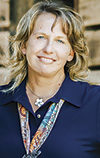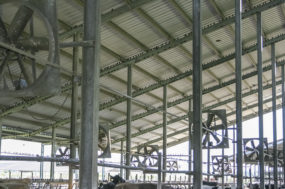Finding myself without a job the summer after my freshman year in college, I asked to be put back into the milking schedule at my parents’ dairy farm in Gettysburg, Pennsylvania. But with the farm growing to 300 cows, my sister, the herdsperson, had filled out the milking schedule with full-time employees.
She wasn’t interested in displacing them for the three months of summer break so I could milk. My dad told me I could work for him in the cropping side of the operation. He was short an equipment operator and could use another person over the busy season.
My initial reaction was that my father must have gone crazy. My previous experiences with equipment had not been good. When I was 14, I jackknifed a hay wagon on the tractor wheel.
And at 16, I took out a car when I got too far over in the gutter, hitting a bridge and knocking the rake wheel off the bed and into the opposite lane. I was far better in the barn than in the field, and the sheer thought of being an equipment operator all summer long terrified me.
But I needed the money, and I figured if Dad was willing to take on the liability of putting me behind the wheel, I’d at least give it a try. To his credit, my dad had four daughters and one son. In our family, there was never specifically “women’s work” or “men’s work.”
He believed that my sisters and I could do almost anything on the farm our brother could do if we wanted to, and he had never once doubted I could do this too.
He was right. By the end of the summer, I had successfully maneuvered a large dually tractor, disc and cultipacker through the center of downtown Gettysburg during the peak tourist season, dragged roof tin straight up the scaffolding of a large California-style commodity shed we were building and figured out how to double-clutch a 10-wheel truck while driving directly beside the forage harvester.
Frankly, I did spend most of the summer wondering what I had gotten myself into. But I knew there were tuition bills that needed to be paid, so I stepped up and dug in. Looking back, it was probably one of the most confidence-building times in my life because, in the end, I had accomplished things I would have told you beforehand were impossible for me to do.
Move out of the comfort zone
Have you ever been challenged to do something for which you felt completely unqualified? Have you ever been faced with a decision that required you to step out of your comfort zone?
Too often, we hold ourselves back from taking on a new role or opportunity simply because we are afraid. In the end, it can mean missing the chance to grow as an individual and, in some cases, to make a meaningful difference.
This past summer, I had the opportunity to step into a new role when our executive director at the Center for Dairy Excellence resigned. After 10 years of believing so strongly in our mission and the center’s vision for Pennsylvania’s dairy industry, I knew it was something I had to do.
But honestly, the thought of putting myself out in front of a statewide organization focused on growing dairy profitability terrified me more than driving the dually tractor through Gettysburg.
But I did step into the role of executive director, and I am so glad I did. It has led to me being involved in conversations that I believe will make a tremendous difference in the path our dairy industry takes here in Pennsylvania and on the opportunities for individual dairy farms to be successful small businesses.
We have a lot to accomplish, but we are talking about issues that matter – like processing capacity, environmental permitting, on-farm profitability and economic development – and we’re looking for solutions to address the challenges at hand.
Like that summer way back in 1992, this experience has allowed me to grow in ways I never thought possible, and it’s all because I decided to not be afraid.
Our industry needs more women and men to take on roles as small business owners, leaders and advocates in our industry and to be willing to take the risks and accept the challenges that come with each of these roles. We need to be willing to engage in the conversations, lead the discussions and facilitate the changes necessary to guide our industry to a stronger future.
We won’t always be perfect at fulfilling the role, but we can bring a level of authenticity and passion that is so desperately needed, both in our industry and in our society.
So next time you’re presented with something you think is impossible for you to do, just consider what you would do if you weren’t afraid. You might surprise yourself with what’s possible. ![]()
Jayne Sebright serves as the executive director for Pennsylvania’s Center for Dairy Excellence. She also owns and operates a dairy farm with her husband in East Berlin, Pennsylvania.

-
Jayne Sebright
- Executive Director
- Pennsylvania’s Center for Dairy Excellence
- Email Jayne Sebright




